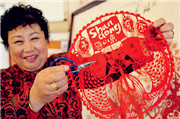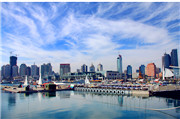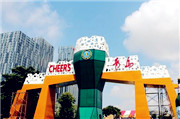Traditional industries
Updated: 2013-04-27
|
|||||||||
Electric appliances
The leading companies, such as Haier, Hisense, and AUCMA are developing quickly and developing support companies so that, now the city has almost 1,000 supporting manufacturers, producing a range of things such as TVs, mobile phones, PCs, SPC exchanges, mobile base stations, network goods, auto electronic goods, radar and satellite navigation systems, sensors, transducers and micro-switches.
There have been breakthroughs in digital TV, mobile communications, ITS, integrated circuitry, and information technology and Information security applications. It also provided 27 of China’s Top Brands and seven Famous Trademarks, while its National Home Appliance And New Industry Demonstration Base for Electronic Information, National Home Appliance Electric Products Industry Park (Qingdao), and National (Qingdao) Communication Industry Park are known across the country.
Petrochemicals
It has had some very large projects, e.g. for an oil refinery with a 10-million-t/a capacity, the Lidong Chemical Industry, national oil reserve base, a Qingdao Port wharf for liquid substances, and national-level petrochemical industry base and has brought in Sinopec Qingdao Refining & Chemical Co, Sinopec Qingdao Petrochemical Co, Anbang Petrochemical, Siyuan Petrochemical, and Huanhai Oil Technology; rubber processors such as Double-star, Yellow Sea Rubber Group, Sailun Tire, Senturytire, Nexentire, Fullrun Tire, Guangming Tire, and Shuangdie; in fine chemicals Shuangtao Chemical Industry, Huntsman Textile & Dying, and BASF Pigment; and in the chemical business Bright Moon Seaweed Group, Shuangrui Anti-corrosion Engineering Co, and the Marine Chemical Research Institute.
Some of its leading domestic products are large oil refinering, ion-exchange membrane caustic soda unit, radial tire production lines, rubber hose braided with steel wire production line, production line for high-strength rubber strips, rubber shoe production line, and new technology carbon black plants, while its strontium salt, soda, PVC, pigments, silica, sodium silicate, tire, rubber shoes, conveyor belts, rubber hose, and seal element are very competitive products.
Automobiles and locomotives
The city has 20 automobile manufacturers (18 for special models) and 260 spare-parts manufacturers, 82 of them large-scale. It has one national automobile export base for the Qingdao Special Automobile Factory, four export bases for spare parts with the Qingte Group, Youjin Cable, Guoren Machinery, and Qingdao Radiator, and. 46 spare parts manufacturers with their own brand. The products of 34 companies meet international standards, while 16 companies are in European, American, and Japanese markets. There is also a spare parts industry cluster in Huangdao, Jiaonan, Jiaozhou, Pingdu and Jimo. Total automobile industry output value for 2010 was 65.84 billion yuan, hp 36.2 percent from the previous year.
In the locomotive business, the city has 29 locomotive and spare parts manufacturers, including CSR Qingdao Sifang Locomotive & Rolling Stock, with a production capacity of 200 locomotives, 650 city metro, 300 top passage Buses, and 120 repair of high-speed trains.
Total locomotive industry output value for 2010 was 34.67 billion yuan, an increase of 39.4 percent from the previous year. Rail and transportation equipment have made the high-tech district a province-level demonstration base for new industrialization.
Textiles and garments
The textile and garments industry has been changing from traditional textiles to garments, household textiles, materials for fabric, textile machinery, technical textiles, and market distribution and development. Its knitting garments, textile machinery, dying and hat manufacturing are large-scale. The city of Jimo earned a "Famous Chinese Knitting City" award and the nearby town of Ligezhuang got the "Chinese Hat Manufacturer" award. Construction work on an R&D base and center for yarn and fabrics, household textiles and garment design has begun and a significant number of companies, including the Jifa Group, Qingdao Textiles Group, Qingdao Xiyingmen Group, Phoenix Printing & Dying, Hongda Textile Machinery, Dongjia Textile Machinery, RCOLLAR Group, and Qingdao Qili Group have famous, competitive brands. Qingdao has nearly 700 large companies and 140,000 people in the textile and garment business. Total industrial output value was150.67 billion yuan, an increase of 17.4percent from the previous year and 11.4 percent of the city's cumulative output of 1.3 tr yuan. Sales reached 140.01 billion yuan, an increase of 16.4percent, and accounting for 11.25 percent of the city's total. The value of exports reached 32.04 billion yuan, a decrease of 1.0 percent, and accounting for 16.68 percent of the city's total. Profits amounted to 12.9 billion yuan, up 17.6percent, and accounting for 11.85 percent of the city's total, among which the profit was 7.02 billion yuan, increased by 12.1percent and account for 12.09percent of total profit in the city.
The city has three national-level, six province-level, and 14 municipal-level technical centers for textile and garment companies, which have three Famous Chinese Trademarks, six Top Chinese Brands, 18 Famous Shandong Province Brands, 21 Top Shandong Brands, 34 “Famous Qingdao Trademarks, and 41 Top Qingdao Brands.
Foodstuff and beverages
Qingdao has industrial systems for agricultural by-product processing, food production, and beverage production and had 2,816 food and beverage manufacturers, in 2011, with 718 having an output worth 180 billion yuan in total, an increase of 21percent year-on-year, and sales of 164 billion yuan, up 20 percent year-on-year. It has a well-developed peanut-processing center in Laixi, food industry center in Pingdu and Jiaozhou, aquatic processing center in Chengyang, Qingdao beer, wine, and Laoshan mineral water. It total agricultural food processing area covers more than 666 million square meters.
Seven of its processing bases, including the Chengyang Aquatic Products Export & Processing Base and Laixi livestock-processing base are national demonstration bases. Laixi’s peanut production base has an annual output of 200,000 tons, accounting for 30 percent of China’s total. The pepper processing zone in Jiaozhou is the biggest in processing and export quantity and a pepper industry information and trade center for China. It was named a "Pepper Processing and Trade Base" for Shandong province, in 2009.
Ship and marine engineering
A ship and marine engineering area has been established on Huang Island at Haixi Bay, and at Jimo and Jiaonan. The Haixi Bay one is a production base for large barges, offshore platforms, low speed diesel machinery, large rollers, decks, ship electrical systems, and water loading. Jimo and Jiaonan are bases and R&D centers for high value-added oil tanks with a 100,000-ton capacity, special ships, high-tech barge equipment, and support products. The total area is 30 square kilometers and its capacity is growing rapidly. The rapid development of recent years has brought in a lot of famous companies, such as the China Shipbuilding Industry Corp, Branch Five, CNOOC Offshore Engineering, PetroChina Offshore Engineering, Yangfan Shipbuilding, and Harbin Engineering University research base. One ship manufacturer has a 500,000-ton capacity, and seven has a capacity of up to 300,000 tons, and the total capacity is expected to grow to more than 6 million tons in the future. The manufacturing capacity of offshore engineering equipment is expected to reach over 1 million tons. Support equipment includes medium- and low-speed diesel engines, rollers, devices for loading water, data logs for ship, boilers, valves, wire, anchor chain, ship electrical systems, and piping, with the data logs and boilers accounting for more than 50 percent of the Chinese market. It also has some top ship research institutes, such as the China Shipbuilding Industry Corp and four province-level technical centers and two municipal-level technical centers.
Machinery and steel
The city's machinery industry contains many subsidiaries in electrical tools, machine tools, and food packaging machinery, and has 323 companies with incomes above 100 million yuan each, 10 of them with incomes are above 1 billion yuan each. The Taifa Group, Hanhe Cable Co, and Qingbian Group joined the Top 500 Manufacturers in China list, in 2010.
More than 55 of its companies are technical centers above the city-level, with Hanhe Cable, the Qingte Group, and D&D Group getting high-tech company recognition from the government. It has bases with their own particular features, such as a production base for textile machinery in Jiaonan, a production base for trolleys in Jiaonan, a production base for steel towers in Jiaozhou, casting production center in Jimo, and production base for boiler support units in Pingdu. In the steel industry, the Qinggang Group is a leader, while the total output of the steel industry as a whole reached 32.59 billion yuan, in 2010, an increase of 12.7percent from the previous year. Iron output at the Qinggang Group reached a little over 3 million tons, steel was just above 3 million tons, and steel products, 3.3 million tons, worth 23.34 billion yuan in all, for an increase of 15.4 percent.




